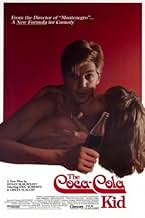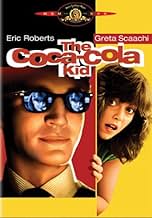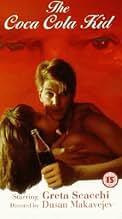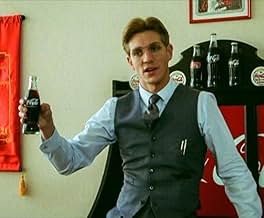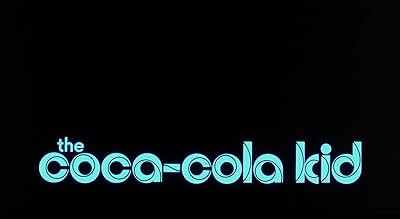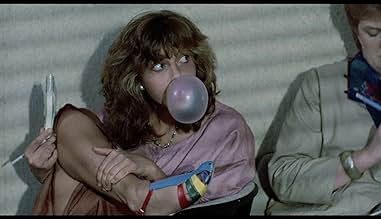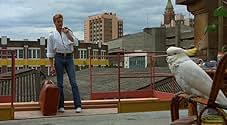IMDb रेटिंग
5.9/10
3.7 हज़ार
आपकी रेटिंग
अपनी भाषा में प्लॉट जोड़ेंEx-marine turned Coca-Cola marketing guru Becker is on a mission to boost sales in Australia when he discovers a dry spot in the Outback, where everyone is guzzling homegrown brew - and not ... सभी पढ़ेंEx-marine turned Coca-Cola marketing guru Becker is on a mission to boost sales in Australia when he discovers a dry spot in the Outback, where everyone is guzzling homegrown brew - and not a drop of his company's cola.Ex-marine turned Coca-Cola marketing guru Becker is on a mission to boost sales in Australia when he discovers a dry spot in the Outback, where everyone is guzzling homegrown brew - and not a drop of his company's cola.
- पुरस्कार
- 8 कुल नामांकन
फ़ीचर्ड समीक्षाएं
The film is billed as a comedy and will indeed leave you laughing at many of the situations the central characters get themselves in and out of. The movie should be viewed as a satire of the great American sales and marketing force on the global marketplace.
A hot shot marketing guru from corporate is assigned to help sales down under. He quickly finds a different pace of life and cultural values that he finds hard to adjust to. He continues on "his way" even down to the music for a new series of commercials. He knows "his way" worked well in the U.S. so it should work well anywhere.
Humorous side trips make the journey enjoyable as the guru quickly finds a large area that has no Coca Cola sales. He goes to investigate and finds a local soft drink bottler has the entire area to himself.
The guru uses every gorilla marketing trick he knows to bring the local bottler into the Coke family, but the local bottler resists and even offers Coke a deal. Coke invades the local's territory and the local realizes he cannot win against the Coke attack.
Coke's decisive win costs the company the guru as he finally begins to understand that other things in life, emotions and cultural values, are more important than business wins.
I enjoyed the film and recommend it to you, especially if you want to see a funny version of the 60's novel "The Ugly American."
A hot shot marketing guru from corporate is assigned to help sales down under. He quickly finds a different pace of life and cultural values that he finds hard to adjust to. He continues on "his way" even down to the music for a new series of commercials. He knows "his way" worked well in the U.S. so it should work well anywhere.
Humorous side trips make the journey enjoyable as the guru quickly finds a large area that has no Coca Cola sales. He goes to investigate and finds a local soft drink bottler has the entire area to himself.
The guru uses every gorilla marketing trick he knows to bring the local bottler into the Coke family, but the local bottler resists and even offers Coke a deal. Coke invades the local's territory and the local realizes he cannot win against the Coke attack.
Coke's decisive win costs the company the guru as he finally begins to understand that other things in life, emotions and cultural values, are more important than business wins.
I enjoyed the film and recommend it to you, especially if you want to see a funny version of the 60's novel "The Ugly American."
Lots of local (Australian) colour and fun being made of corporate America. This is what we like. :-)
It's about 10 years since I last saw the film and I still sometimes finding myself humming the song, "choke back the tears when there's no Coca-Cola".
Not a great film, but another welcome Aussie comedy.
It's about 10 years since I last saw the film and I still sometimes finding myself humming the song, "choke back the tears when there's no Coca-Cola".
Not a great film, but another welcome Aussie comedy.
Call me strange, call me tasteless, but I found this film to be one of those movies that haunts me. Eric Roberts as the gung-ho Coke executive out to undo T.George McDowell's stranglehold on outback softdrink sales is just amazing. The scene near the beginning where Roberts is scanning an electronic map showing per capita Coke sales throughout Australia is brilliant, especially as they get down into the outback areas and discover that not only are Coke sales slim, but in one area, utterly non-existent.
Roberts' growing relationship with Greta Sciacci's character and DMZ, played wonderfully by child actress Rebecca Smart, weaves a romantic thread throughout the film, touching us even as we feel the intense need to thwap him over the head and make him see that this is the woman for him.
The scene of Coke trucks driven by Santa Claus costumed drivers pouring into T. George's compound is a killer, especially with that jingle (Sung by Neil Finn of Crowded House fame) roaring in the background. I can't understand why Coke has not purchased the rights to this jingle and used it in its advertising. Like another reviewer, I can't get that jingle out of my mind, even 15 years after seeing the movie.
Roberts' growing relationship with Greta Sciacci's character and DMZ, played wonderfully by child actress Rebecca Smart, weaves a romantic thread throughout the film, touching us even as we feel the intense need to thwap him over the head and make him see that this is the woman for him.
The scene of Coke trucks driven by Santa Claus costumed drivers pouring into T. George's compound is a killer, especially with that jingle (Sung by Neil Finn of Crowded House fame) roaring in the background. I can't understand why Coke has not purchased the rights to this jingle and used it in its advertising. Like another reviewer, I can't get that jingle out of my mind, even 15 years after seeing the movie.
This tale of an American marketing guru sent to improve Coke's sales in Australia was mildly enjoyable. It's certainly not the worst film ever made, but the main character, played by Eric Roberts, is more than slightly over the top, to the point of being obnoxious, in fact, pretty unlikeable. Still, with some mild intrigue and a blooming romance, the movie will hold your attention just to find out what happens.
As to the nasty little fact ruining a good theory: I'd previously held that directors, especially Europeans, invariable fail when they attempt to address economic and social concepts via sex and violence. It's a theory supported by several of Jodorowsky's films, and by this director, Dusan Makavajev's, epic failures "W.R. Mysteries of the Organism" and "Sweet Movie." These films support their moderately valid theses in ways as insubstantial and juvenile as the old Chi-com propaganda comic books that attempted to rationalize the downfall of the Gang of Four.
But with "The Coca Cola Kid", Makavajev succeeds -- with less violence, and a lot less sex -- most likely because he addresses only one slice of the theoretical pie, and because he delivers a more coherent, standard narrative flow. He directed but didn't write it, of course. This dramatization of global corporate dominance was filmed while WalMart was only in the early stages of eradicating mom and pop, and while Google, Amazon, and Facebook were just leftists' vague nightmares. Any system, economic or otherwise, that lacks negative feedback will veer out of control, and the Kid personifies the attitude that lets it happen.
As often happens on Amazon Video, this R-rated film is censored; most of the shower scene with Terri and her daughter -- and the accompanying dialog -- has been deleted.
It's a film worth seeing once.
As to the nasty little fact ruining a good theory: I'd previously held that directors, especially Europeans, invariable fail when they attempt to address economic and social concepts via sex and violence. It's a theory supported by several of Jodorowsky's films, and by this director, Dusan Makavajev's, epic failures "W.R. Mysteries of the Organism" and "Sweet Movie." These films support their moderately valid theses in ways as insubstantial and juvenile as the old Chi-com propaganda comic books that attempted to rationalize the downfall of the Gang of Four.
But with "The Coca Cola Kid", Makavajev succeeds -- with less violence, and a lot less sex -- most likely because he addresses only one slice of the theoretical pie, and because he delivers a more coherent, standard narrative flow. He directed but didn't write it, of course. This dramatization of global corporate dominance was filmed while WalMart was only in the early stages of eradicating mom and pop, and while Google, Amazon, and Facebook were just leftists' vague nightmares. Any system, economic or otherwise, that lacks negative feedback will veer out of control, and the Kid personifies the attitude that lets it happen.
As often happens on Amazon Video, this R-rated film is censored; most of the shower scene with Terri and her daughter -- and the accompanying dialog -- has been deleted.
It's a film worth seeing once.
The opening titles for The Coca-Cola Kid make it clear that the film is in no way sponsored by Coca-Cola or the Coca-Cola bottling company. Obviously the company felt comfortable enough with the final product to let the film use their name, but it's hardly a glowing picture of the soft drink giant. In The Coca-Cola Kid, Coca-Cola is the face of American Imperialism. When company trouble shooter Becker (Eric Roberts) declares, "The world will not be truly free until Coke is available everywhere," he's speaking without irony. This film, then, is about Becker's attempts to help Coca-Cola colonize Australia, but what starts off as a film of comic promise and originality becomes bogged down in convention and cliché to the point that it's difficult by the final reel to remember what was so appealing at the beginning.
The Coca-Cola Kid fits nicely in the genre of American Corporate Fish Out Of Water tales. If you've seen the delightful Local Hero, for example, you'll know that no matter what kind of tough American goes off to the rural wasteland, he'll change, enlightened by the small town quirks and wisdom he was meant to subvert. That's not really giving anything away in this film, because the last act doesn't play out as you expect. In fact, it hardly plays out at all.
Becker arrives in Australia to help boost lagging sales. It turns out that there's a whole region of the country where no Coke is sold at all. Becker, a former marine with the proverbial "unorthodox way of doing business," discovers that that region is ruled over by T. George McDowell (Bill Kerr) a gruff man of homespun wisdom, but more importantly, homemade soft drinks, made from real fruit. Even though their first encounter is rough, Becker is determined to fight off the advances of his secretary-with-a-secret (Greta Scacchi) and the hotel waiter who mistakes him for an arms dealer to do the job he was sent to do.
Directed by Dusan Makavejev, The Coca-Cola Kid develops a wonderful momentum early on. In fact, the first hour of the film is an absolute gem. Eric Roberts's performance to that point is perfect. His presentation to the bemused Coke officials is comic gold, as he waxes poetic about the fizzy beverage, even holding it up to the light bathing the room in its brown glow. Roberts's early scenes with Scacchi have a nice screwball touch and his interactions with Scacchi's moppet daughter provide a nice depth for the character, hinting at something beyond his intensity. There's a nifty sequence where Becker enlists a studio band to try to come up with the "sound of Australia" where they go through several absurd suggestions before coming up with a truly catchy jingle.
I'm not sure how far it is into the movie, but for me things begin to go south immediately after that recording session. For reasons completely unclear to me, the secretary has Becker invited to a party to catch him in an awkward position. This involves completely random intimations of homosexuality and ends of feeling both forced and pointless. The scene is so clumsy that it leaves a bad taste that begins to spread.
It rapidly becomes clear that The Coca-Cola Kid isn't going to omit a single convention of Australian culture. You want an old bushman with a diggerydoo (inevitably misspelled, but my dictionary is letting me down)? You've got it. An adorable wounded Kangaroo? Bingo! And a slightly inbred man singing a rousing chorus of "Walzing Matilda?" Yup-Yup. In fact, the vision of Australia put forth by the film is so cookie-cutter that it's hard to feel bad about the culture being overrun by American interests. You support Coke because you figure they're at least putting forth a good product.
Eric Roberts's performance finally ends up being a little infuriating because he's not given any opportunity or reason to be anything other than amusingly scary. The film falls apart at just the point you wish Roberts would go through the obligatory character alteration, but there's just no chance. He's stranded. Ditto Scacchi. She adorable and makes the sexiest Santa in the history of cinema, but her character's payoff is weak. Bill Kerr is excellent for the most part, but you can't help but feel that his cagey old Outback Vet is a character we've seen a thousand times.
The Coca-Cola Kid's best and most consistent feature is its cinematography by Dean Semler. The Oscar winner (for Dances With Wolves) does what the script and director can't do -- he creates the ironic counterpoint between the Outback, the big city, and Eric Roberts. The film has a dynamic look which, unlike the narrative, doesn't fall apart at the end.
I do feel bad about only giving this movie a 6/10, but I guess I should have just turned it off early. Off to drink a Coke...
The Coca-Cola Kid fits nicely in the genre of American Corporate Fish Out Of Water tales. If you've seen the delightful Local Hero, for example, you'll know that no matter what kind of tough American goes off to the rural wasteland, he'll change, enlightened by the small town quirks and wisdom he was meant to subvert. That's not really giving anything away in this film, because the last act doesn't play out as you expect. In fact, it hardly plays out at all.
Becker arrives in Australia to help boost lagging sales. It turns out that there's a whole region of the country where no Coke is sold at all. Becker, a former marine with the proverbial "unorthodox way of doing business," discovers that that region is ruled over by T. George McDowell (Bill Kerr) a gruff man of homespun wisdom, but more importantly, homemade soft drinks, made from real fruit. Even though their first encounter is rough, Becker is determined to fight off the advances of his secretary-with-a-secret (Greta Scacchi) and the hotel waiter who mistakes him for an arms dealer to do the job he was sent to do.
Directed by Dusan Makavejev, The Coca-Cola Kid develops a wonderful momentum early on. In fact, the first hour of the film is an absolute gem. Eric Roberts's performance to that point is perfect. His presentation to the bemused Coke officials is comic gold, as he waxes poetic about the fizzy beverage, even holding it up to the light bathing the room in its brown glow. Roberts's early scenes with Scacchi have a nice screwball touch and his interactions with Scacchi's moppet daughter provide a nice depth for the character, hinting at something beyond his intensity. There's a nifty sequence where Becker enlists a studio band to try to come up with the "sound of Australia" where they go through several absurd suggestions before coming up with a truly catchy jingle.
I'm not sure how far it is into the movie, but for me things begin to go south immediately after that recording session. For reasons completely unclear to me, the secretary has Becker invited to a party to catch him in an awkward position. This involves completely random intimations of homosexuality and ends of feeling both forced and pointless. The scene is so clumsy that it leaves a bad taste that begins to spread.
It rapidly becomes clear that The Coca-Cola Kid isn't going to omit a single convention of Australian culture. You want an old bushman with a diggerydoo (inevitably misspelled, but my dictionary is letting me down)? You've got it. An adorable wounded Kangaroo? Bingo! And a slightly inbred man singing a rousing chorus of "Walzing Matilda?" Yup-Yup. In fact, the vision of Australia put forth by the film is so cookie-cutter that it's hard to feel bad about the culture being overrun by American interests. You support Coke because you figure they're at least putting forth a good product.
Eric Roberts's performance finally ends up being a little infuriating because he's not given any opportunity or reason to be anything other than amusingly scary. The film falls apart at just the point you wish Roberts would go through the obligatory character alteration, but there's just no chance. He's stranded. Ditto Scacchi. She adorable and makes the sexiest Santa in the history of cinema, but her character's payoff is weak. Bill Kerr is excellent for the most part, but you can't help but feel that his cagey old Outback Vet is a character we've seen a thousand times.
The Coca-Cola Kid's best and most consistent feature is its cinematography by Dean Semler. The Oscar winner (for Dances With Wolves) does what the script and director can't do -- he creates the ironic counterpoint between the Outback, the big city, and Eric Roberts. The film has a dynamic look which, unlike the narrative, doesn't fall apart at the end.
I do feel bad about only giving this movie a 6/10, but I guess I should have just turned it off early. Off to drink a Coke...
क्या आपको पता है
- ट्रिवियाThis film was produced without the knowledge or consent of the international offices of the Coca-Cola Company. However, since both the company and its product were depicted so favorably in the film (as well as the film being free advertising), they took no legal action against the parties involved.
- गूफ़The room service man hands Becker a silenced revolver. With the exception of obsolete Russian Nagant M1895, revolvers are not able to be suppressed because the cylinder/barrel gap allows hot gas, and therefore sound, to escape.
- क्रेज़ी क्रेडिटCatering: 'Kaos' (Highly recommended by the whole cast & crew)
- इसके अलावा अन्य वर्जनThe 2002 MGM DVD fades out the music and ends the movie as the credits end, but the original film continues the end credits song "Home for My Heart" over a black screen for about 50 seconds and then fades it out.
- साउंडट्रैकHome For My Heart
Composed & written by Tim Finn
Performed by Tim Finn, Phil Manzanera, Alan Spenner, Charlie Morgan & Guy Fletcher
Produced by Phil Manzanera, Cup/Enz Productions
With the permission of CBS/Mushroom Records, Mushroom Music & Enz Music
टॉप पसंद
रेटिंग देने के लिए साइन-इन करें और वैयक्तिकृत सुझावों के लिए वॉचलिस्ट करें
- How long is The Coca-Cola Kid?Alexa द्वारा संचालित
विवरण
- रिलीज़ की तारीख़
- कंट्री ऑफ़ ओरिजिन
- भाषा
- इस रूप में भी जाना जाता है
- Coca Cola Kid
- फ़िल्माने की जगहें
- उत्पादन कंपनियां
- IMDbPro पर और कंपनी क्रेडिट देखें
बॉक्स ऑफ़िस
- दुनिया भर में सकल
- $93
- चलने की अवधि
- 1 घं 38 मि(98 min)
- ध्वनि मिश्रण
- पक्ष अनुपात
- 1.85 : 1
इस पेज में योगदान दें
किसी बदलाव का सुझाव दें या अनुपलब्ध कॉन्टेंट जोड़ें


